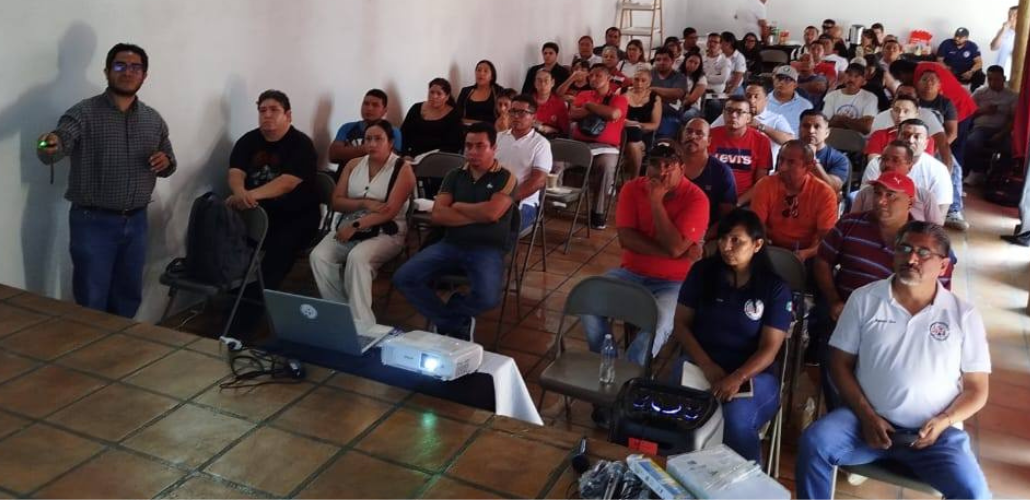Independent Union Loses Bid to Represent Second Mexico GM Plant

SINTTIA members gathered for a discussion on the automotive sector. Photo: SINTTIA
The independent National Auto Workers Union (SINTTIA) lost its bid to represent General Motors workers at the company’s San Luis Potosí SUV plant. Workers there voted to join another union, Carlos Leone, with ties to the Confederation of Mexican Workers (CTM), which is notorious for its employer-friendly contracts.
SINTTIA, which has represented workers at another Mexican GM pickup truck plant since 2022, received 1,115 votes, while the Carlos Leone union pulled in 1,888. Only half of the plant’s 6,500 workers voted.
SINTTIA alleges that the Carlos Leone union received support from GM management. After workers voted out their company union, a CTM affiliate, in 2023, the company installed a “labor council” at the plant, largely made up of CTM supporters. As soon as SINTTIA’s efforts to organize at the San Luis Potosí plant became public in April, the majority of representatives on the labor council resigned and began collecting signatures for the Carlos Leone union.
WITH HELP FROM GM?
SINTTIA claims that Carlos Leone supporters were allowed to collect signatures from the workers on company time, and given sensitive lists of worker information to facilitate signature gathering. That allowed the union to meet the 30 percent threshold required to get on the ballot within days; SINTTIA, meanwhile, had been gathering signatures over the course of three years.
The Federal Center for Conciliation and Labor Registry (CFCRL), which maintains Mexico’s registry of unions and resolves disputes through conciliation, provided SINTTIA with a list of workers eligible to be in the bargaining unit, sourced from the company. According to SINTTIA advisor Willebaldo Gómez Zuppa, at least 1,000 names on the list of nearly 7,500 were supervisory employees, and thus ineligible to be included in the bargaining unit. The union reported the issue, and a new list was issued—but at least 500 supervisory employees remained on the list, and thus could have been among those who signed to get the Carlos Leone union on the ballot.

SUPPORT LABOR NOTES
BECOME A MONTHLY DONOR
Give $10 a month or more and get our "Fight the Boss, Build the Union" T-shirt.
The election itself, too, was marked by irregularities and inconsistent access. Because the polls operated from 5 a.m. to 7 p.m., workers on the night shift (6 p.m. to 6 a.m.) only had an hour upon arriving and an hour before leaving to vote. But many workers are bussed from as much as three hours away, and their buses do not arrive at the facility until minutes before their shift begins—and voting afterwards would put them at risk of missing the bus home.
Workers were denied authorization to leave their work stations to vote, particularly those identified as SINTTIA supporters, said Gómez Zuppa. By the time the CFCRL stepped in and got GM to shut down the facility from 2 p.m. to 3 p.m. and 6 p.m. to 7 p.m so workers could vote, many workers had finished their shifts for the week. Supervisors held meetings telling workers that if they voted for SINTTIA they would be fired, he added.
Smears that SINTTIA is a U.S. union front to bring back auto jobs north of the border were shared widely in videos and on social media. SINTTIA made efforts to counteract this narrative by “demonstrating SINTTIA’s democratic processes, that all of SINTTIA’s leadership are workers in the plants SINTTIA has a presence in, and that instead of jobs leaving elsewhere, what we’ve achieved have been the best negotiations in the industry over the past 30 years,” said Gómez Zuppa. But the climate of uncertainty across the auto industry was front of mind for workers, he said.
The union plans to contest the election results, Gómez Zuppa said, and is drawing lessons from the setback. “One difficult lesson is that I think we’ve reached the limit of what the labor reform [can offer],” he said, referring to the series of reforms to Mexico’s labor law passed in 2019 which were supposed to weaken the vise grip that politically connected, employer-friendly unions have over the country’s labor movement. “We can’t count on institutions; [we can only] count on worker organizing.” The union has had discussions as to whether they should have taken a more aggressive tack. “We trusted that the company was going to act justly, without interference. I think that was a grave mistake.”





You must log in or register to post a comment.